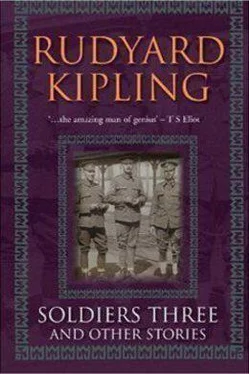Rudyard Kipling - Soldiers Three
Здесь есть возможность читать онлайн «Rudyard Kipling - Soldiers Three» весь текст электронной книги совершенно бесплатно (целиком полную версию без сокращений). В некоторых случаях можно слушать аудио, скачать через торрент в формате fb2 и присутствует краткое содержание. Год выпуска: 2014, Издательство: epubBooks Classics, Жанр: Классическая проза, на английском языке. Описание произведения, (предисловие) а так же отзывы посетителей доступны на портале библиотеки ЛибКат.
- Название:Soldiers Three
- Автор:
- Издательство:epubBooks Classics
- Жанр:
- Год:2014
- ISBN:нет данных
- Рейтинг книги:5 / 5. Голосов: 1
-
Избранное:Добавить в избранное
- Отзывы:
-
Ваша оценка:
- 100
- 1
- 2
- 3
- 4
- 5
Soldiers Three: краткое содержание, описание и аннотация
Предлагаем к чтению аннотацию, описание, краткое содержание или предисловие (зависит от того, что написал сам автор книги «Soldiers Three»). Если вы не нашли необходимую информацию о книге — напишите в комментариях, мы постараемся отыскать её.
Soldiers Three — читать онлайн бесплатно полную книгу (весь текст) целиком
Ниже представлен текст книги, разбитый по страницам. Система сохранения места последней прочитанной страницы, позволяет с удобством читать онлайн бесплатно книгу «Soldiers Three», без необходимости каждый раз заново искать на чём Вы остановились. Поставьте закладку, и сможете в любой момент перейти на страницу, на которой закончили чтение.
Интервал:
Закладка:
'Yesterday,' gulped Justus, 'she taught in the school A,B,C,D.—Oh! It is the work of Satan!'
But Gallio was curiously regarding the maiden's petticoat where it had fallen at his feet. He felt its texture, drew back his shirt–sleeve beyond the deep tan of his wrist and pressed a fold of the cloth against the flesh. A blotch of angry red rose on the white skin.
'Ah!' said Gallio calmly, 'I thought so.'
'What is it?' said Justus.
'I should call it the Shirt of Nessus, but—Where did you get the fibre of this cloth from?'
'Athon Daze,' said Justus. 'He showed the boys how it should manufactured be.'
'The old fox! Do you know that he has given you the Nilgiri Nettle—scorpion— Girardenia heterophylla —to work up? No wonder they squirmed! Why, it stings even when they make bridge–ropes of it, unless it's soaked for six weeks. The cunning brute! It would take about half an hour to burn through their thick hides, and then—!'
Gallio burst into laughter, but Lotta was weeping in the arms of the Collector's wife, and Justus had covered his face with his hands.
'Girardenia heterophylla!' repeated Gallio. 'Krenk, why didn't you tell me? I could have saved you this. Woven fire! Anybody but a naked Kol would have known it, and, if I'm a judge of their ways, you'll never get them back.'
He looked across the river to where the converts were still wallowing and wailing in the shallows, and the laughter died out of his eyes, for he saw that the Tubingen Mission to the Buria Kol was dead.
Never again, though they hung mournfully round the deserted school for three months, could Lotta or Justus coax back even the most promising of their flock. No! The end of conversion was the fire of the Bad Place—fire that ran through the limbs and gnawed into the bones. Who dare a second time tempt the anger of Dungara? Let the little man and his wife go elsewhere. The Buria Kol would have none of them. An unofficial message to Athon Daze that if a hair of their heads were touched, Athon Daze and the priests of Dungara would be hanged by Gallio at the temple shrine, protected Justus and Lotta from the stumpy poisoned arrows of the Buria Kol, but neither fish nor fowl, honeycomb, salt nor young pig were brought to their doors any more. And, alas! man cannot live by grace alone if meat be wanting.
'Let us go, mine wife,' said Justus; 'there is no good here, and the Lord has willed that some other man shall the work take—in good time—in His own good time. We will go away, and I will—yes—some botany bestudy.'
If any one is anxious to convert the Buria Kol afresh, there lies at least the core of a mission–house under the hill of Panth. But the chapel and school have long since fallen back into jungle.
At Howli Thana
His own shoe, his own head.
—Native Proverb.As a messenger, if the heart of the Presence be moved to so great favour. And on six rupees. Yes, Sahib, for I have three little children whose stomachs are always empty, and corn is now but forty pounds to the rupee. I will make so clever a messenger that you shall all day long be pleased with me, and, at the end of the year, bestow a turban. I know all the roads of the Station and many other things. Aha, Sahib! I am clever. Give me service. I was aforetime in the Police. A bad character? Now without doubt an enemy has told this tale. Never was I a scamp. I am a man of clean heart, and all my words are true. They knew this when I was in the Police. They said: 'Afzal Khan is a true speaker in whose words men may trust.' I am a Delhi Pathan, Sahib—all Delhi Pathans are good men. You have seen Delhi? Yes, it is true that there be many scamps among the Delhi Pathans. How wise is the Sahib! Nothing is hid from his eyes, and he will make me his messenger, and I will take all his notes secretly and without ostentation. Nay, Sahib, God is my witness that I meant no evil. I have long desired to serve under a true Sahib—a virtuous Sahib. Many young Sahibs are as devils unchained. With these Sahibs I would take no service—not though all the stomachs of my little children were crying for bread.
Why am I not still in the Police? I will speak true talk. An evil came to the Thana—to Ram Baksh, the Havildar, and Maula Baksh, and Juggut Ram and Bhim Singh and Suruj Bul. Ram Baksh is in the jail for a space, and so also is Maula Baksh.
It was at the Thana of Howli, on the road that leads to Gokral–Seetarun wherein are many dacoits. We were all brave men—Rustums. Wherefore we were sent to that Thana which was eight miles from the next Thana. All day and all night we watched for dacoits. Why does the Sahib laugh? Nay, I will make a confession. The dacoits were too clever, and, seeing this, we made no further trouble. It was in the hot weather. What can a man do in the hot days? Is the Sahib who is so strong—is he, even, vigorous in that hour? We made an arrangement with the dacoits for the sake of peace. That was the work of the Havildar who was fat. Ho! Ho! Sahib, he is now getting thin in the jail among the carpets. The Havildar said:' Give us no trouble, and we will give you no trouble. At the end of the reaping send us a man to lead before the judge, a man of infirm mind against whom the trumped–up case will break down, Thus we shall save our honour.' To this talk the dacoits agreed, and we had no trouble at the Thana, and could eat melons in peace, sitting upon our charpoys all day long. Sweet as sugar–cane are the melons of Howli.
Now there was an assistant commissioner—a Stunt Sahib, in that district, called Yunkum Sahib. Aha! He was hard–hard even as is the Sahib who, without doubt, will give me the shadow of his protection. Many eyes had Yunkum Sahib, and moved quickly through his district. Men called him The Tiger of Gokral–Seetarun, because he would arrive unannounced and make his kill, and, before sunset, would be giving trouble to the Tehsildars thirty miles away. No one knew the comings or the goings of Yunkum Sahib. He had no camp, and when his horse was weary he rode upon a devil–carriage. I do not know its name, but the Sahib sat in the midst of three silver wheels that made no creaking, and drave them with his legs, prancing like a bean–fed horse—thus. A shadow of a hawk upon the fields was not more without noise than the devil–carriage of Yunkum Sahib. It was here: it was there: it was gone: and the rapport was made, and there was trouble. Ask the Tehsildar of Rohestri how the hen–stealing came to be known, Sahib.
It fell upon a night that we of the Thana slept according to custom upon our charpoys, having eaten the evening meal and drunk tobacco. When we awoke in the morning, behold, of our six rifles not one remained! Also, the big Police–book that was in the Havildar's charge was gone. Seeing these things, we were very much afraid, thinking on our parts that the dacoits, regardless of honour, had come by night, and put us to shame. Then said Ram Baksh, the Havildar:' Be silent! The business is an evil business, but it may yet go well. Let us make the case complete. Bring a kid and my tulwar. See you not now, O fools? A kick for a horse, but a word is enough for a man.'
We of the Thana, perceiving quickly what was in the mind of the Havildar, and greatly fearing that the service would be lost, made haste to take the kid into the inner room, and attended to the words of the Havildar. 'Twenty dacoits came,' said the Havildar, and we, taking his words, repeated after him according to custom. 'There was a great fight,' said the Havildar, 'and of us no man escaped unhurt. The bars of the window were broken. Suruj Bul, see thou to that; and, O men, put speed into your work, for a runner must go with the news to The Tiger of Gokral–Seetarun.' Thereon, Suruj Bul, leaning with his shoulder, brake in the bars of the window, and I, beating her with a whip, made the Havildar's mare skip among the melon–beds till they were much trodden with hoof–prints.
Читать дальшеИнтервал:
Закладка:
Похожие книги на «Soldiers Three»
Представляем Вашему вниманию похожие книги на «Soldiers Three» списком для выбора. Мы отобрали схожую по названию и смыслу литературу в надежде предоставить читателям больше вариантов отыскать новые, интересные, ещё непрочитанные произведения.
Обсуждение, отзывы о книге «Soldiers Three» и просто собственные мнения читателей. Оставьте ваши комментарии, напишите, что Вы думаете о произведении, его смысле или главных героях. Укажите что конкретно понравилось, а что нет, и почему Вы так считаете.












